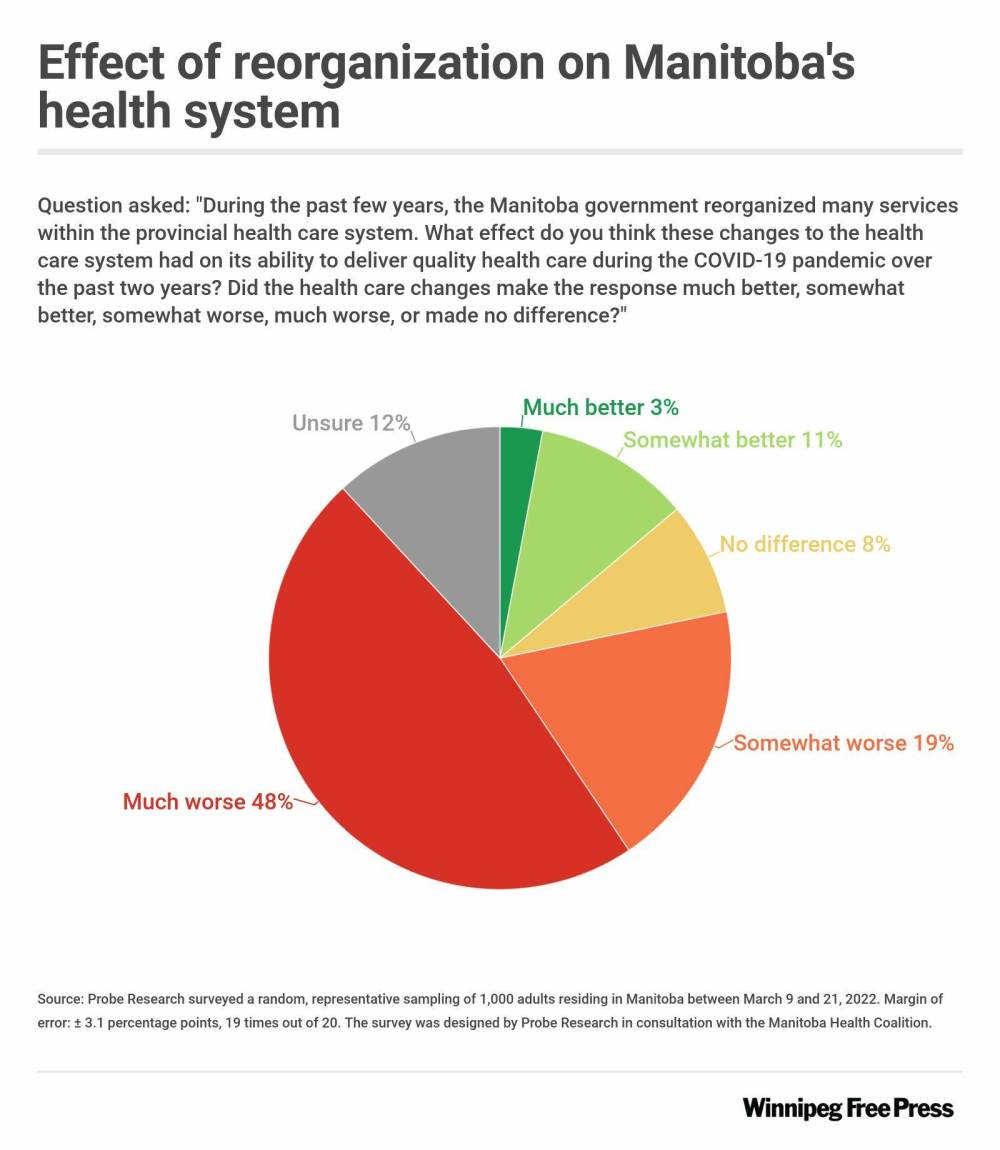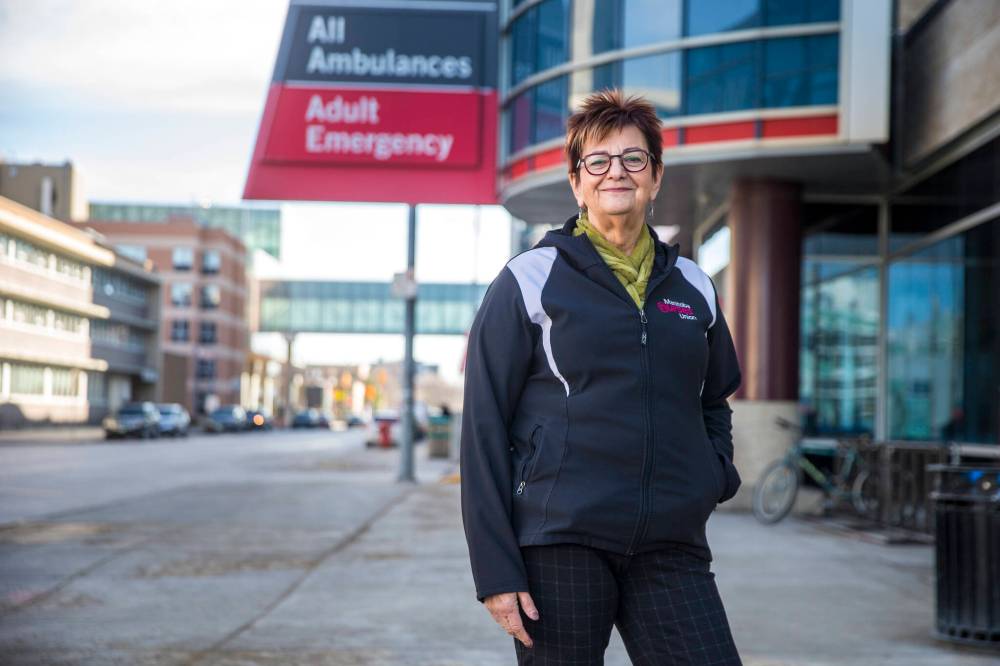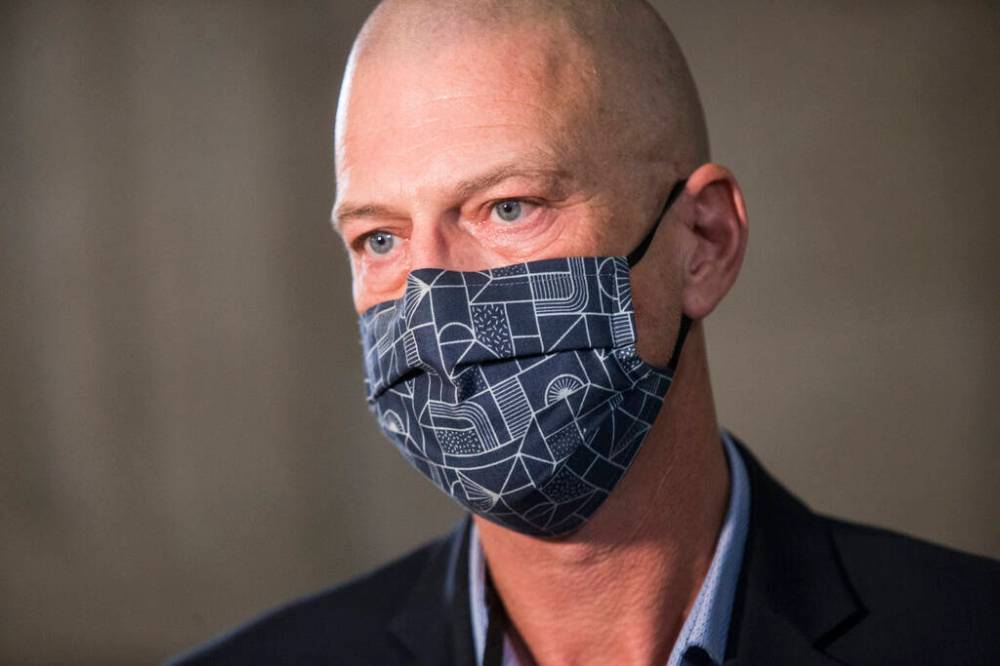Tories have made health-care system sicker, majority in poll say
Two-thirds of Manitobans blame Pallister-imposed cuts, consolidation for spiralling crisis; workers’ unions report interminable ER waits, hallway stays, hasty ICU discharges
Advertisement
Read this article for free:
or
Already have an account? Log in here »
To continue reading, please subscribe:
Monthly Digital Subscription
$19 $0 for the first 4 weeks*
- Enjoy unlimited reading on winnipegfreepress.com
- Read the E-Edition, our digital replica newspaper
- Access News Break, our award-winning app
- Play interactive puzzles
*No charge for 4 weeks then billed as $19 every four weeks (new subscribers and qualified returning subscribers only). Cancel anytime.
Read unlimited articles for free today:
or
Already have an account? Log in here »
Hey there, time traveller!
This article was published 30/03/2022 (904 days ago), so information in it may no longer be current.
Manitoba’s health-care system appears to be teetering on the brink and most people blame the provincial government for the worsening chaos and suffering, a new poll reveals.
The Probe Research poll, commissioned by the Manitoba Health Coalition found two-thirds of residents believe health-care changes implemented by former premier Brian Pallister in 2017, which included closing three of Winnipeg’s six hospital emergency wards, have made health service delivery “much worse” or “worse.”
Some patients, facing a wait, in some cases, of six hours or longer to see a physician, are giving up and going home, say unions representing nurses and other health-care workers.
The unions say there are patients spending up to 10 days on stretchers in ER hallways waiting to be admitted. As well, they say patients have been discharged directly from intensive care rather than getting transitional care in a step-down ward.
The Probe poll shows just over one in 10 Manitobans believe the system’s ability to deliver quality care is better. A similar number say it has made no difference or gave no opinion.
“We are not surprised at all by the findings,” said Thomas Linner, provincial director of the coalition. “But it is a little more overwhelming than we thought it would be.”
MHC is a non-profit, non-partisan health-care advocacy organization that works to support universal public health care.
More than two-thirds of survey respondents said the government should hire and train more staff and buy more equipment in the public system to shrink the massive surgery and diagnostics backlog in the province.
Only one-quarter of Manitobans think the solution is to send patients to private health-care providers — including out of the country — to get treatment sooner.
“We knew the government and certain people have been really pushing for private delivery on some of these issues, but this shows Manitobans believe that we should do it here,” Linner said.
“And, the ongoing benefit is, if we bring the waiting times down, we can keep it down for the medium and the long term. You would then see critical-care not over-extended and not seeing nurses work triple shifts.”

Manitoba Nurses Union president Darlene Jackson said the return of hallway medicine is not news to anyone in health care.
“As we have said exhaustively, a hospital bed is just a bed without a nurse,” Jackson said. “If the pandemic is truly over, and if we aren’t actually in a critical nursing shortage, then why are our hospital hallways, particularly in ERs, overflowing with patients waiting to be treated?”
Jackson said Premier Heather Stefanson and other members of her cabinet should be thinking about how they will be remembered long after the next election.
“Is a profession of broken health-care workers to be her legacy?” she said. “A backlog of patients waiting to for surgery that extends before our province’s borders? Or is it something we’ve yet to see?”
Bob Moroz, president of the Manitoba Association of Health Care Professionals, said what’s happening is not a recent problem in hospitals.
“We’ve been hearing things have been bad for months,” Moroz said.
“The capacity in our system now is so tight there is just no room for new patients… the system has just been virtually dismantled for us to handle anything out of the ordinary.”

Moroz said about 30 per cent of people who visit the emergency department at Health Sciences Centre leave without being seen by a doctor.
“Ten days is not unusual waiting for admission and they say people are waiting 16 hours to see a doctor,” he said.
“And, horrifyingly, people are being discharged directly from ICU to home when really they should end up going to a step-down ward first.”
A Shared Health spokesman acknowledged wait times for patients with “less urgent needs remains well above normal levels in HSC Winnipeg’s emergency department,” what hasn’t changed is they won’t be discharged until it is safe and appropriate to do so.
And the spokesman said while most people treated in the ICU go to a step-down unit bed, there are times when a patient is judged to have recovered sufficiently to go directly home.
City councillor Shawn Nason recently had a front-row seat to the crisis.
Nason, who suffered an anaphylactic episode, waited two hours in Concordia Hospital’s urgent-care centre before leaving without being seen by a doctor.
“There were 10 people in treatment and 11 people waiting with a 5 1/2 wait,” he said. “That number didn’t change in the two hours I was there.
“There were people really frustrated.”
NDP health critic Uzoma Asagwara has heard from many frustrated Manitobans.
“The minister of health during the third (COVID-19) wave is now the premier and she has had enough time to take action and she has failed,” Asagwara said. “The PCs are trying to convince Manitobans that highway and hallway medicine is the norm.”
The poll of 1,000 Manitoba adults was conducted between March 9 and 21 and is accurate within plus or minus 3.1 per cent with 95 per cent accuracy.
kevin.rollason@freepress.mb.ca


Kevin Rollason
Reporter
Kevin Rollason is one of the more versatile reporters at the Winnipeg Free Press. Whether it is covering city hall, the law courts, or general reporting, Rollason can be counted on to not only answer the 5 Ws — Who, What, When, Where and Why — but to do it in an interesting and accessible way for readers.
Our newsroom depends on a growing audience of readers to power our journalism. If you are not a paid reader, please consider becoming a subscriber.
Our newsroom depends on its audience of readers to power our journalism. Thank you for your support.
History
Updated on Thursday, March 31, 2022 6:04 AM CDT: Corrects that two-thirds of residents believe health-care changes have made health service delivery "much worse" or "worse."




